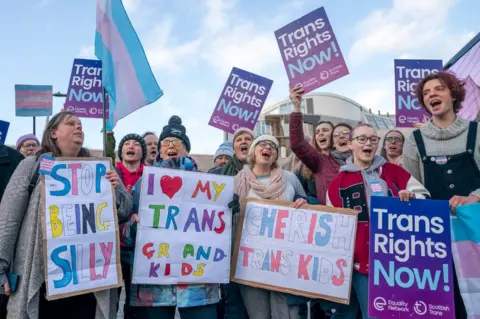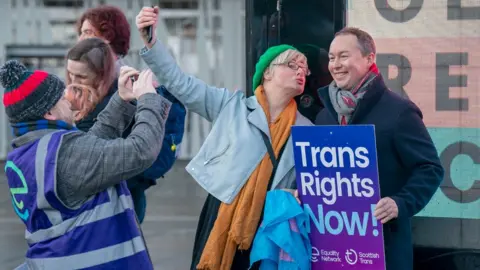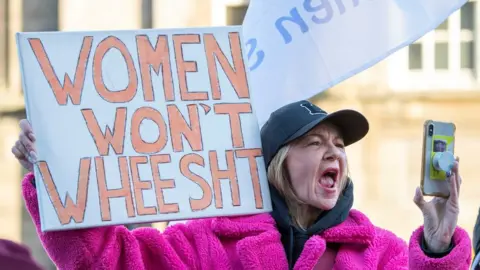What's happening with Scotland's gender reform plans?
 PA Media
PA MediaA court has rejected claims that the UK government did not have reasonable grounds to block reforms that would make to make it easier for people in Scotland to change their legally recognised sex.
MSPs voted in December last year to pass the controversial Gender Recognition (Reform) Bill by 86 votes to 39.
But in an equally contentious move, Scottish Secretary Alister Jack then used UK government powers to veto the bill, saying it could interfere with equalities law across the whole country.
The Scottish government lodged a legal challenge at the Court of Session in a bid to overturn that decision - but judges have now ruled that the UK government acted lawfully.

What is the current system?
The Scottish government wants to simplify and speed up the existing process by which people can obtain a gender recognition certificate - the legal recognition of a trans person's "acquired" gender.
At present, people apply to a UK gender recognition panel and typically must present a diagnosis of gender dysphoria.
This is defined by the NHS as being caused by a "mismatch" between their biological sex (whether they were born physically male or female) and their gender identity (the way in which they see and describe themselves).
Applicants need to provide two medical reports, one from a specialist detailing their diagnosis and another listing any treatment or surgery they may have had to change their sexual characteristics.
They must also prove they have lived full-time in their acquired gender for at least two years - for example showing they have used a different name in official documents, or changed their gender on their driving licence or passport - and swear an oath that they intend to continue for the rest of their lives.
What are the Scottish plans?
 PA Media
PA MediaThe Scottish government argues that the current process is too difficult and invasive, and causes distress to an already marginalised and vulnerable minority group.
Its plans would see applications handled by the Registrar General for Scotland, rather than the UK panel.
No diagnosis or medical reports would be required, and the period in which applicants need to have lived in their acquired gender would be cut to three months.
One of the most controversial proposals is to lower the minimum age that someone can apply from 18 to 16 - although 16 and 17-year-olds would need to have lived as their acquired gender for six months rather than three.
Anyone wanting to change their legal gender will still need to swear an oath about remaining this way for life - with it being a criminal offence to make a false declaration or application - and there would be a three-month "reflection period" before a certificate was issued.
In theory, only a small number of people would be directly affected by any reforms, with the NHS estimating that transgender people make up about 0.5% of the population.
Ireland made similar changes in 2015 and had granted an average of 115 applications per year up to 2020.
What do critics say?
 PA Media
PA MediaSome campaigners are concerned that allowing anyone to "self-identify" as a woman could impact on the rights women have fought for decades to secure, and which are themselves enshrined in equalities law.
There are also concerns about access to women-only spaces and services, including hospital wards and refuges.
While attitudes towards gender may have become more fluid, many things in society are still binary - from changing rooms to elite sporting events to prisons - and some are wary about changing this.
The relatively narrow issue of the certification process has become a focal point for a broader debate about gender identity and politics. The debate has become hotly contested, in particular online.
 JK Rowling
JK RowlingSeveral prominent SNP politicians - including government ministers Kate Forbes, Ash Regan and Ivan McKee - signed a letter in 2019 urging the government not to "rush" the proposals, arguing that "changing the definition of male and female is a matter of profound significance".
Ms Regan quit as a government minister ahead of a debate on the bill, saying that her conscience would not allow her to support the plans.
During the SNP leadership campaign in 2023, she and Ms Forbes both said they would not challenge the Section 35 order in court. Ms Forbes also said she would not have voted for the bill in its current form and that she had "significant concerns" about self-identification.
Author JK Rowling has been one of the most prominent voices in the debate, saying that reading about the Scottish government's proposals had "triggered" her due to memories of being sexually assaulted.
The author, who lives in Edinburgh, posted a picture of herself with a T-shirt describing former First Minister Sturgeon as a "destroyer of women's rights" in support of a protest against the changes outside the Scottish Parliament.
For Women Scotland, an organisation who describe themselves as "working to protect and strengthen women and children's rights", voiced support for the UK government's decision to block the bill.
What do supporters say?
 PA Media
PA MediaScottish LGBT+ organisations have described the current gender recognition process as outdated and dehumanising.
Campaigners say a move to make trans peoples' lives easier is long overdue, and will allow them to "live with the dignity and recognition that everyone deserves."
Scottish Trans manager Vic Valentine said the changes would enable trans men and women to show a birth certificate "that reflects who they are" at important moments in their lives, such as starting a job or giving notice to be married.
Ms Sturgeon - who resigned as first minister in February - described herself as "a lifelong feminist" but said it was "really important" to protect and enhance the rights of trans people. She insisted that trans rights and women's rights need not clash.
Ms Sturgeon described the UK government's decision to block the bill as a "full-frontal attack" on the Scottish Parliament and accused the UK government of using trans people as a "political weapon".
Her successor Humza Yousaf described the use of the Section 35 order as "unacceptable", and decided to press ahead with the legal challenge after taking office as first minister.
The case was heard at the Court of Session in Edinburgh, which ruled in favour of the UK government.
However, the case could ultimately be appealed all the way to the Supreme Court.
